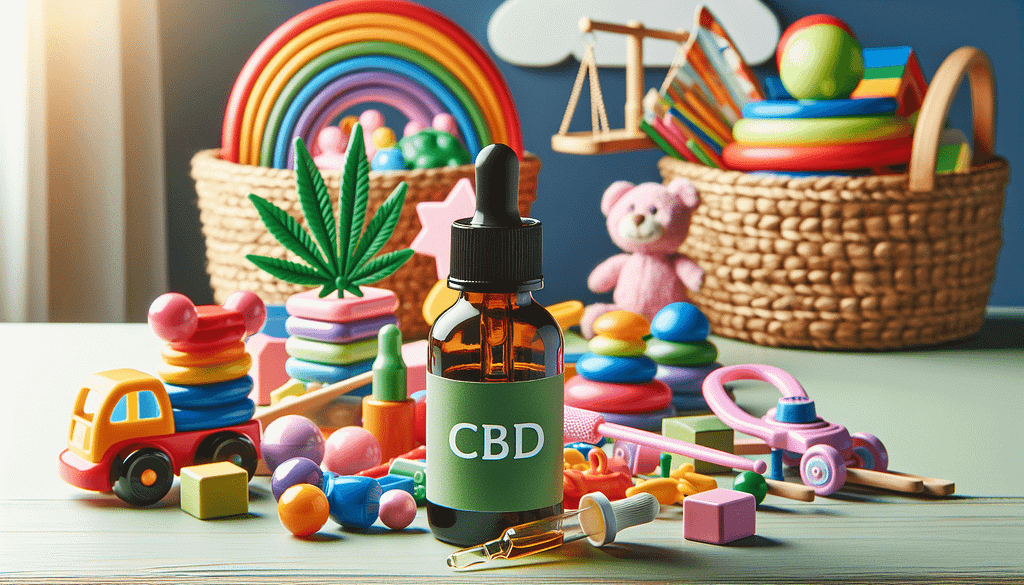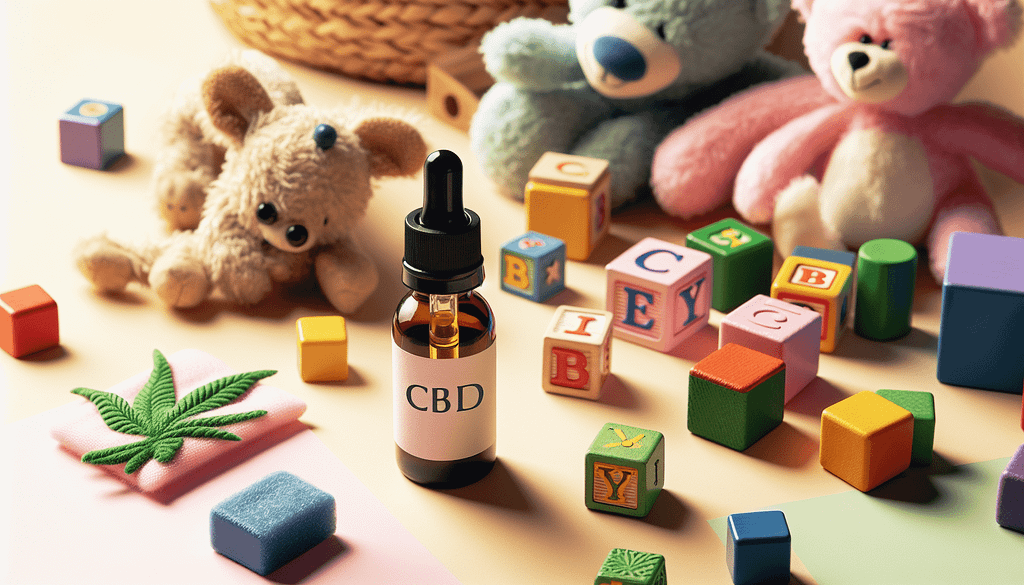As an Amazon Associate I earn from qualifying purchases.
Explore CBD as an alternative treatment for children with ADHD. Gain insights, potential benefits, and considerations to help manage your child’s symptoms effectively.
Children With ADHD: Exploring CBD As An Alternative Treatment
Attention Deficit Hyperactivity Disorder (ADHD) is one of the most common neurodevelopmental disorders in children. If you’re a parent raising a child with ADHD, you’re no stranger to the daily challenges it brings. From keeping focused in school to maintaining healthy relationships, children with ADHD often find themselves struggling in many areas of life. This article will walk you through the world of CBD as an alternative treatment for ADHD in children, offering insights, detailed information, and a friendly perspective on this increasingly popular option.

Understanding ADHD
To effectively evaluate any treatment for ADHD, it’s crucial to understand what the disorder is and how it impacts your child’s life.
What Is ADHD?
ADHD stands for Attention Deficit Hyperactivity Disorder. It is typically characterized by a combination of persistent issues such as difficulty paying attention, hyperactivity, and impulsive behavior. There are three types of ADHD: predominantly inattentive presentation, predominantly hyperactive-impulsive presentation, and combined presentation.
Symptoms of ADHD in Children
Children with ADHD may exhibit a variety of symptoms, which can make daily life challenging for both the child and the parent.
- Inattentiveness: Difficulty focusing, frequent daydreaming, and trouble following instructions.
- Hyperactivity: Inability to sit still, excessive talking, and constant movement.
- Impulsivity: Acting without thinking, interrupting conversations, and difficulty waiting their turn.
Traditional Treatments for ADHD
Before diving into CBD, let’s review the conventional treatments for ADHD. Understanding these can provide a useful benchmark for evaluating alternative options.
Medication
Many children with ADHD are prescribed stimulant medications such as Ritalin or Adderall. These drugs can have significant benefits, but they also come with potential side effects such as sleep problems, decreased appetite, and mood swings.
Behavioral Therapy
Behavioral therapy is another cornerstone of ADHD treatment. It involves teaching children skills to manage their symptoms, such as organizational skills, time management, and social skills.
Lifestyle Changes
Modifying your child’s lifestyle can also have a positive impact on managing ADHD. This includes regular physical activity, a healthy diet, and a structured daily routine.
What Is CBD?
CBD, or cannabidiol, is a compound found in cannabis plants. Unlike THC, another well-known compound in cannabis, CBD does not produce a “high.” It’s gaining popularity for its potential therapeutic benefits, including its use in managing symptoms of various health conditions.
How CBD Works
CBD interacts with the endocannabinoid system (ECS) in our bodies. The ECS plays a role in regulating a variety of functions, including mood, sleep, appetite, and immune response. CBD is thought to influence these functions by interacting with cannabinoid receptors in the body.
The Science Behind CBD and ADHD
Research on CBD and ADHD is still in its early stages, but there are some promising findings that suggest it could be a useful alternative treatment.
Preliminary Studies
Several preliminary studies suggest that CBD may help with symptoms of ADHD. For example, some research indicates that CBD can help improve focus and reduce impulsivity, two key challenges for children with ADHD.
Parent and Patient Reports
Although scientific research is still evolving, many parents and patients report positive results from using CBD to manage ADHD symptoms. Anecdotal evidence suggests that CBD may help reduce hyperactivity and improve attention spans.
Benefits of Using CBD for ADHD
Exploring the potential benefits of CBD can help you decide whether it’s worth considering as an alternative treatment for your child’s ADHD.
Reduced Hyperactivity
Many parents report that CBD helps reduce hyperactivity in their children. This can make it easier for them to participate in classroom activities and social interactions.
Improved Focus
CBD may also improve focus and attention spans. This could help your child perform better academically and complete tasks more efficiently.
Lowered Anxiety
Children with ADHD often experience anxiety, which can exacerbate their symptoms. CBD has been shown to have anti-anxiety properties, which could help alleviate some of your child’s stress and improve their overall well-being.
Risks and Considerations
While the potential benefits of CBD are appealing, it’s equally important to consider the risks and make informed decisions.
Potential Side Effects
CBD is generally considered safe, but it can have side effects. These may include drowsiness, dry mouth, and changes in appetite. It’s essential to monitor your child for any adverse reactions and consult a healthcare professional.
Legal and Regulatory Issues
The legality of CBD varies depending on where you live. Make sure you’re aware of the local laws regarding CBD use, especially when considering it for your child.
Quality and Dosage
The market for CBD products is not well-regulated, which means the potency and purity can vary widely. Always choose high-quality products from reputable sources and consult with a healthcare professional to determine the appropriate dosage for your child.

How to Introduce CBD to Your Child
If you’re considering CBD as a treatment option, you’ll need to know how to introduce it to your child safely and effectively.
Consult a Healthcare Professional
Before starting any new treatment, it’s crucial to consult your child’s healthcare provider. They can help you understand the potential benefits and risks and guide you in determining the appropriate dosage.
Start Low and Go Slow
It’s advisable to start with a low dosage of CBD and gradually increase it as needed. This can help minimize any potential side effects and allow you to monitor how your child responds to the treatment.
Monitor and Adjust
Keep a close eye on your child’s symptoms and overall well-being. Regularly consult with your healthcare provider to make any necessary adjustments to the dosage or treatment plan.
Real-Life Experiences With CBD and ADHD
Personal stories and testimonials can provide valuable insights into what you might expect when using CBD to manage ADHD in your child.
Success Stories
Many parents have shared their success stories, reporting that CBD has significantly improved their child’s quality of life by reducing symptoms and enhancing overall well-being.
Challenges Faced
Not every experience with CBD is positive. Some parents have faced challenges, such as finding the right dosage or dealing with side effects. Learning from these experiences can help you better prepare and make informed decisions.
Social and Psychological Considerations
Using CBD as a treatment for ADHD not only impacts your child but also influences their social relationships and psychological health.
Social Integration
Improved focus and reduced hyperactivity can make it easier for your child to form and maintain friendships, participate in group activities, and engage more fully in their social environment.
Self-Esteem and Confidence
Managing ADHD symptoms effectively can boost your child’s self-esteem and confidence. With better control over their actions and improved performance in school and social settings, they may feel more positive about themselves and their abilities.
CBD Products for Children With ADHD
Knowing which CBD products are available and how to use them can make the process smoother and more effective.
Types of CBD Products
There are various forms of CBD products that you can consider for your child:
- CBD Oil: A versatile option that can be taken orally or added to food and drinks.
- CBD Gummies: Child-friendly and easy to dose.
- CBD Capsules: A convenient option, especially for older children.
- Topicals: Usually not recommended for ADHD but could be helpful for localized pain or skin conditions.
Choosing the Right Product
When selecting a CBD product, prioritize quality and safety. Look for third-party lab testing and opt for products with clear labeling and dosage instructions.
Future of CBD in ADHD Treatment
As research continues to advance, the future of CBD in treating ADHD looks promising.
Ongoing Research
Numerous studies are underway to better understand the efficacy and safety of CBD for ADHD. These studies will likely provide more concrete evidence and guidelines in the coming years.
Potential for Broader Acceptance
As more parents and healthcare providers recognize the potential benefits of CBD, it may become a more widely accepted treatment option for ADHD.
Making an Informed Decision
Ultimately, the choice to use CBD as a treatment for your child’s ADHD is a personal one that should be made with careful consideration.
Weighing the Pros and Cons
Consider all the potential benefits and risks, consult with healthcare professionals, and do thorough research before making a decision.
Advocating for Your Child
As a parent, you are your child’s best advocate. Make sure to have open and honest discussions with your child’s healthcare providers to ensure that any treatment plan is in your child’s best interest.
Final Thoughts
Exploring CBD as an alternative treatment for ADHD can open up new possibilities for managing your child’s symptoms. While it may not be a one-size-fits-all solution, CBD offers a promising avenue for those seeking alternative or complementary treatments. Always remember to prioritize your child’s safety and well-being and consult healthcare professionals before making any changes to their treatment plan.
If you found this article helpful, please consider clapping, leaving a comment, and subscribing to my Medium newsletter for updates on similar topics. Your engagement helps me continue to provide valuable information. Thank you!
Disclosure: This story incorporates AI assistance for content creation.
Disclosure: As an Amazon Associate, I earn from qualifying purchases.
Amazon and the Amazon logo are trademarks of Amazon.com, Inc, or its affiliates.

